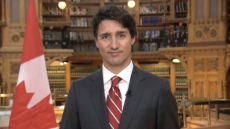OTTAWA — Canada's parole officers say the country's corrections system is at a breaking point due to workloads that are "insurmountable" — a situation they say poses real risks to public safety.
A recent survey of parole officers by the Union of Safety and Justice Employees suggested more than two-thirds of parole workers are worried they're not able to properly protect the public because they do not have time to adequately assess, supervise and prepare offenders for release.
The union, which represents the officers, says this means many offenders are left to fall through the cracks — offenders who, in some cases, may re-offend and harm the public or themselves.
"What we're saying is that we are at a critical point here. We have parole officers throughout our survey who are genuinely concerned about public safety," said David Neufeld, a national vice-president of the union.
"Almost 70 per cent of our members who responded to the survey are saying that they're worried that they're not able to sufficiently protect the public because of their current workloads. Things can get missed. Information can get missed."
The survey results were included in a report issued this week by the Union of Safety and Justice Employees, offering a detailed breakdown of the concerns being raised by the 1,600 parole officers in Canada's corrections system.
About half of Canada's federal parole officers work inside penitentiaries and correctional institutions. The rest work with inmates in the community after they are released. They are responsible for developing correctional plans for each inmate, which is how decisions are made about what levels of security inmates need and what kinds of rehabilitation programs will help them.
Decisions made by parole officers determine when and how inmates are released, as well, and into what transitional facilities.
Last fall, a federal auditor general's report found that the Correctional Service of Canada didn't have enough spots in halfway houses for prisoners who were ready to begin reintegrating. The report said parole officers often didn't get key information about inmates' health as they prepared release plans, and officers dealing with parolees often couldn't meet offenders as often as they should have.
That report echoes findings by authorities at other levels. Ontario's auditor general, for instance, reported in 2014 that officers doing similar work at the provincial level often couldn't supervise high-risk offenders adequately and weren't equipped to deal with offenders' mental-health problems. A follow-up assessment two years later found little to no progress had been made on several important recommendations.
The federal officers say high caseloads and chronic understaffing have led to "insurmountable challenges to managing offender risk."
"Many worry these unmanageable workloads mean key pieces of information could be missed in the monitoring of an offender, which in turn, could impact the safety of the community where the offender is released," the report states.
Lines from officers who provided comments for the survey paint a picture of employees suffering anxiety, depression and burnout.
"I'm so busy trying to keep my head above water that the chances I'm missing something is inevitable," says an unnamed parole officer quoted in the report.
Neufeld says the problems stem from funding cuts under the former Conservative government, which led to a reduction in staff and increased caseloads for many officers.
Since then, new approaches introduced by the Trudeau government to deal with the overrepresentation of Indigenous people in Canada's penal system have only added to officer caseloads, Neufeld said.
In addition, policy changes aimed at reducing the use of solitary confinement in prisons have not led to a corresponding increase in staff or resources to deal with growing numbers of inmates with mental health and addictions issues, according to the union.
But Public Safety Minister Ralph Goodale's spokesman Scott Bardsley said significant investments have been made in the correctional system, totalling almost $700 million. Much of this money has been attached to policy changes involving expanded mental-health care in prisons and more healing and rehabilitative care for Indigenous inmates.
The union report says an increased emphasis on moving inmates toward release has added to the concern about risks to public safety, Neufeld says.
"With the change in government there was a renewed focus on reintegration ... and we've been very successful in increasing the number of inmates being released back into our communities, but the resourcing has not been improved or increased in the community," he said.
"What we've seen is that parole officers struggle greatly with the amount of work that is on their hands in trying to monitor these offenders very closely and ensuring we're having the quality contact that is required to really understand how well is that offender really doing on the street and how safe is it for them to come back to our communities."
The union is calling for more staff and more resources to ensure inmates are being properly assessed for risk.
In January, Goodale held a roundtable in Ottawa with community and institutional parole officers from across the country where the workers were able to outline their concerns.
Bardsley said money to hire additional parole officers and other staff is attached to the Liberals' corrections legislation, Bill C-83, which is before the Senate.
"We know there is more work to do, and we look forward to doing it in partnership with parole officers," Bardsley said in a statement, adding a dig at the former Conservative government for "penny-pinching" in areas of public safety.


